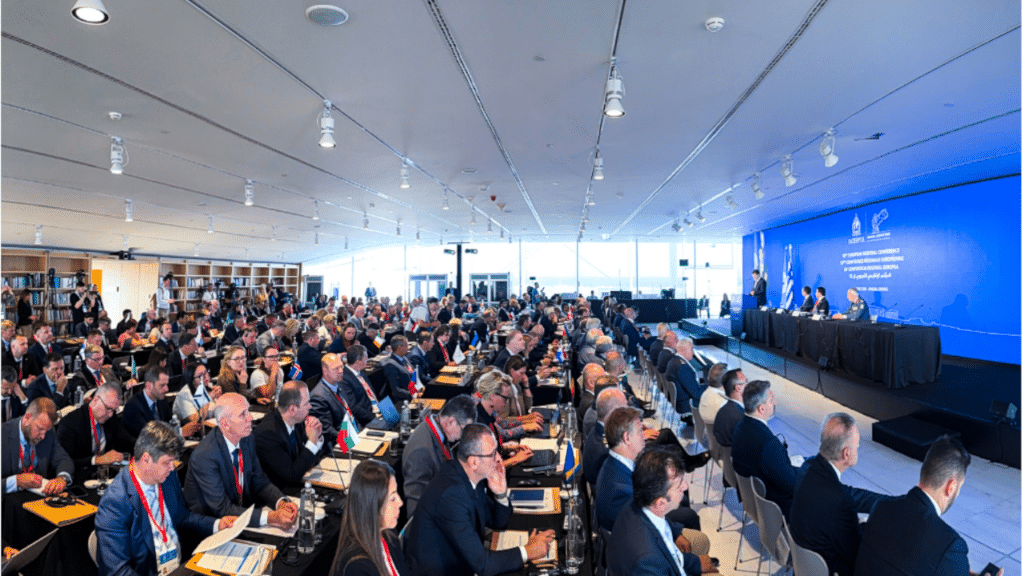The increasing complexity of international crime was addressed at INTERPOL’s 52nd European Regional Conference, which was hosted in Athens, Greece.
The three-day conference, held between 2 – 4 June, brought more than 150 senior police representatives from Europe and around the world, to address major challenges for European policing and the impact of international crime on the region.
The conference was opened by Michalis Chrysochoidis, Minister of Citizen Protection of Greece, Lieutenant General Dimitrios Mallios, Chief of the Hellenic Police, Major General Ahmed Nader Al-Raisi, President of INTERPOL and Valdecy Urquiza, Secretary General of INTERPOL.
Delegates addressed the evolving nature of crime in Europe, including changing security threats in Europe, the dark side of Artificial Intelligence and the Silver Notice, a pilot launched by INTERPOL this year to help trace and recover criminal assets.
Chaired by INTERPOL’s Vice President for Europe, Peter de Buysscher, the meeting of senior police officials also looked at some of the most serious criminal activity, including drug and firearms trafficking and the link between organised crime and terrorism.
“It is a great honour to host in Athens the 52nd INTERPOL European Regional Conference, an important meeting, which in those days of global and regional instability is more important and necessary,” Michalis Chrysochoidis, Minister of Citizen Protection of Greece, said while addressing the opening ceremony of the conference. “We need to stay united, with a common approach to security and policing. The main topics of this year’s conference are absolutely timely.
“Emerging security threats and especially organised crime, the abuse of artificial intelligence, environmental crime, and human trafficking, are not isolated challenges, but very important and interconnected security threats.
“To counter those threats we need intelligence, technology, and new tools and above all partnership. We need to work together.
“I want to express my sincere thanks to INTERPOL’s leadership for their tireless work in supporting operational coordination, innovation, and capability development.
“The tools and platforms offered by INTERPOL as the Biometric Hub and the ICSE database, or joint operations like Lionfish—are examples to what international cooperation can achieve when backed by political will and professional excellence.”
“For the Hellenic Police, international cooperation is imperative,” Lieutenant General Dimitrios Mallios, Chief of the Hellenic Police, added. “Greece’s geographic location at the crossroad of three continents, with a fluid security landscape, marked by successive crises are reasons to remain vigilant.
“We are dedicated to contributing to Europe’s security architecture and we do this by actively engaging in all Interpol’s activities.
“This Conference offers us a vital opportunity to deepen that cooperation, to share knowledge, and to explore new tools and strategies that will help us respond swiftly and effectively to all evolving threats.
“Whether it is building capacity in digital forensics, enhancing border security, or dismantling criminal networks, our success depends on coordination, trust, and shared commitment. Let us also not forget the human side of our work—the communities we protect, the victims we serve, and the future generations we strive to safeguard.”
“We are grateful to the Greek authorities for hosting us in Athens, the birthplace of a civilisation that shaped the world, when Europe is at a critical moment,” INTERPOL President, Ahmed Naser Al-Raisi, said. “It faces threats that cross borders, spread online, and deeply affect human lives. And while national efforts are vital, only strong regional and global cooperation can truly stop them.
“We must be even more determined to find these criminals, stop them, and bring them to justice. We must also keep our eyes on the future. From artificial intelligence to biometric identity systems and darknet surveillance, we are entering an era of complexity.
“That is why INTERPOL is investing in innovation to ensure you stay ahead of evolving crime. From artificial intelligence and digital forensics to virtual training and detection of synthetic media, we are equipping police with the technology needed to act in today’s complex environment.”
“Law enforcement in Europe and around the world is facing increasingly complex, evolving criminal threats and challenges,” Valdecy Urquiza, Secretary General of INTERPOL, concluded. “Whether from emerging technologies, changes to existing serious criminal activity, or new networks being created by criminal groups, these innovations make it harder for police to prevent criminal activity and maintain public safety.
“This conference shows that the international policing community can and will respond. I am delighted to be working alongside colleagues to share best practice, develop cutting-edge capabilities and to work together to prevent international crime.
“INTERPOL is committed to bringing more critical data into Europe, supporting more high-value operation actions and supporting European police, including through improved systems to enable law enforcement across Europe and the world to have the best possible tools.”
During the three-day conference, delegates also elected members of the INTERPOL European Committee and addressed motions on organised crime, cybercrime and a new INTERPOL information sharing system.
To read more INTERPOL news, click here.





